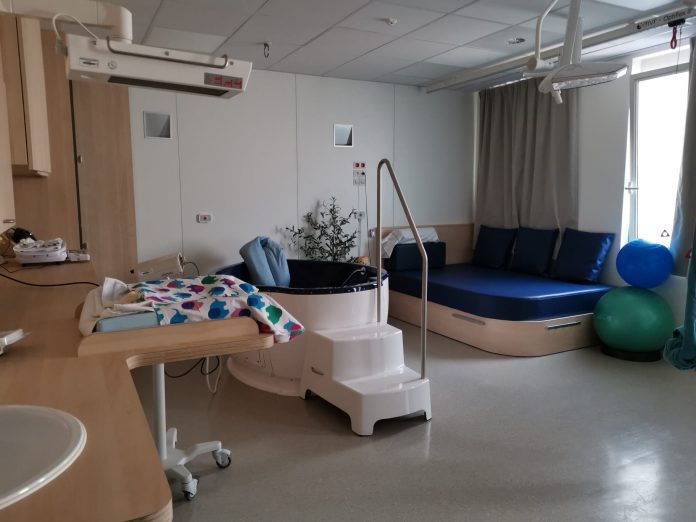by Kate Ellwood
Raising your children starts with birthing your baby. And your birth experience can have a profound effect on your postnatal recovery, your risk of postnatal depression, and your breastfeeding journey.
When you’re considering your choices for the birth of your baby, there are two key questions you need to explore:
- who is going to be with you when your baby is born?
- where is the best place for your baby to be born that is most likely to give you and your baby the safest birth and the best possible birth experience?
In Brussels, expectant parents will soon have more choice than ever when it comes to answering these two questions. Because by September 2024, all Brussels hospitals that have a maternity ward will have to open a midwife-led unit, or birth centre. This is an internal hospital unit where a fit, healthy woman pregnant with a healthy baby can be cared for exclusively by midwives.
Hospitals that cannot offer this will have to allow access to their delivery rooms to general practitioners and independent midwives. The philosophy behind the move is to promote physiological birth (i.e. without the need for clinical interventions), a focus on continuity of care, and informed decision-making.
Erasme hospital’s Le Cocon birth centre is currently the only midwife-led unit in Brussels.
What is special about a midwife-led unit, or birth centre?
A birth centre offers a middle ground between a home birth and a more medicalised birth in a ‘normal’ hospital labour ward.
In a birth centre, women give birth in a home-like environment where all medical equipment is hidden, with no objects that could cause fear or stress. Birthing rooms typically have a double bed, decorations on the wall, soft lighting, and a bathtub – some even look more like a hotel room than a hospital room.
While the rooms appear to be ‘demedicalised’, they of course have all the necessary equipment on hand to support a physiological birth and also to allow action to be taken fast in the event of an emergency.
From prenatal consultations to postnatal follow-up, it’s midwives who provide care in a birth centre, without intervention from gynaecologists. Gynaecologists are available and contactable in the event of a problem. But if all goes well, all a woman’s care is provided by the midwives, including during birth.
A safe and viable option with fewer interventions
The annual report of midwife-led births in Belgium published in January 2024 shows that midwifery-led care positively impacts a woman’s birth experience and reduces medical interventions – findings that are corroborated by scientific literature.
“Evidence from the literature supports midwifery-led care as being safe, effective, and associated with fewer interventions.”
Raipuria HD, Lovett B, Lucas L, Hughes V 2018
Of 1,587 women who started their labour with a midwife, only 19% had to be transferred to second line care, i.e. a gynaecologist or to hospital. Eight out of ten women therefore gave birth with their midwife without an epidural and with no clinical interventions.
Some women will undoubtedly prefer to birth their baby in a classic hospital labour suite, with their gynaecologist present, perhaps even reassured by the sight of machines and equipment, and that is their choice. But, this new obligation for hospitals will give everyone the opportunity to make a real choice and go where they feel best.
Does Brussels have enough trained midwives to support this change?
In light of this decision by the Brussels government, it is important that a sufficient number of qualified midwives can work in these birth centres. Currently, there are few settings where recently graduated midwives can train to increase their skills to support a physiological birth and to handle emergency cases.
“Continuity of care is key, and providing options so women and families can make informed decisions which results in a better birthing experience.”
Maud Vanwalleghem, Zwanger in Brussel
To address this issue, Molenbeek-based midwifery practice Zwanger in Brussel (founded by Elke Van Den Bergh in 2008) has developed a certified course on midwifery-led care. Participants from a different range of backgrounds participated in order to increase their awareness of the principles of midwifery-led care and to practice specific midwifery skills.
Coordinator of the project, Maud Vanwalleghem, is satisfied with the results: “Our midwives formed a community, a safe space where they could reflect on the essence of what it means to be a midwife. Continuity of care is key, and providing options so women and families can make informed decisions which results in a better birthing experience.”
The start of a new era
Le Cocon birth centre in Erasme Hospital has welcomed around 2200 babies since it opened in 2014 – proof that women in Brussels (and beyond) do want something different than Belgium’s more medicalised approach to birth.
By further increasing access to midwife-led care, and re-empowering midwives, the Brussels authorities could be setting in motion a real shift in Belgian birthing culture.





